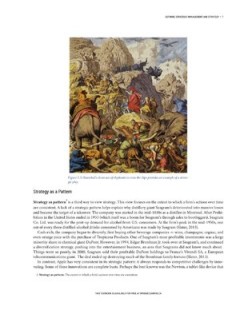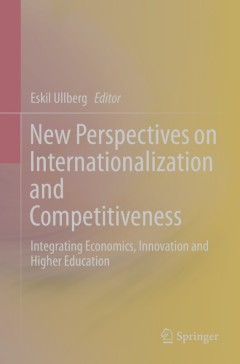Filter by

Energy Policy Making in the EU Building the Agenda
The book adopts an innovative analytical approach to agenda setting by not only presenting successful cases in which energy issues were addressed by means of public policy, but by also analyzing failed attempts to make issues part of the European policy agenda. Another outstanding feature of the book is its use of the latest empirical data on a broad range of energy issues. When are energy i…
- Edition
- -
- ISBN/ISSN
- 978-1-4471-6645-0
- Collation
- 14 b/w illustrations
- Series Title
- -
- Call Number
- -

Energy Management of Internet Data Centers in Smart Grid
This book reports the latest findings on intelligent energy management of Internet data centers in smart-grid environments. The book gathers novel research ideas in Internet data center energy management, especially scenarios with cyber-related vulnerabilities, power outages and carbon emission constraints. The book will be of interest to university researchers, R&D engineers and graduate stude…
- Edition
- -
- ISBN/ISSN
- 978-3-662-45676-7
- Collation
- 23 b/w illustrations
- Series Title
- -
- Call Number
- -

Energy Management in Wireless Cellular and Ad-hoc Networks
This book investigates energy management approaches for energy efficient or energy-centric system design and architecture and presents end-to-end energy management in the recent heterogeneous-type wireless network medium. It also considers energy management in wireless sensor and mesh networks by exploiting energy efficient transmission techniques and protocols. and explores energy management i…
- Edition
- -
- ISBN/ISSN
- 978-3-319-27568-0
- Collation
- 134 b/w illustrations, 50 illustrations in colour
- Series Title
- -
- Call Number
- -

Energy Law: An Introduction
The aim of this short text is simply to introduce a reader to this topic. It is intended for a global audience and rather than being restricted to potential energy law students of a particular country. It is also written for students of other disciplines such as geographers, social scientists and engineers. It should also be engaging to those in a variety of professional practices who want an a…
- Edition
- -
- ISBN/ISSN
- 978-3-319-14191-6
- Collation
- 1 b/w illustrations, 1 illustrations in colour
- Series Title
- -
- Call Number
- -

Energy Law in Brazil Oil, Gas and Biofuels
This book describes the energy-law situation in Brazil. It focuses on three specific energy sectors: oil, natural gas and biofuel. The decision to concentrate on these areas takes into account the role that these energy sectors play in the economic, political and legal systems in Brazil, as well as the fact that they are the primary subjects of current discussions surrounding economic regulatio…
- Edition
- -
- ISBN/ISSN
- 978-3-319-14268-5
- Collation
- 2 b/w illustrations, 3 illustrations in colour
- Series Title
- -
- Call Number
- -

Energy Informatics 4th D-A-CH Conference, EI 2015, Karlsruhe, Germany, Novem…
This book constitutes the refereed proceedings of the 4th D-A-CH Conference on Energy Informatics, D-A-CH EI 2015, held in Karlsruhe, Germany, in November 2015. The 18 revised full papers presented were carefully reviewed and selected from 36 submissions. The papers are organized in topical sections on distributed energy sources and storage, smart meters and monitoring, research lab infrastruc…
- Edition
- -
- ISBN/ISSN
- 978-3-319-25876-8
- Collation
- 92 b/w illustrations
- Series Title
- -
- Call Number
- -

Energy Efficiency Benefits for Environment and Society
This book discusses how energy efficiency benefits the global environment, national energy security, local pollution mitigation, natural resource conservation, and utility bill reduction. In addition, this book provides many hands-on skills and knowledge to identify and develop energy efficiency projects. The literature review shows that energy efficiency has become the first fuel in the world …
- Edition
- -
- ISBN/ISSN
- 978-1-4471-6666-5
- Collation
- 34 illustrations in colour
- Series Title
- -
- Call Number
- -

Energy Demand in Industry What Factors Are Important?
The book presents a stochastic analysis based on production risk and application of this method in the industrial sector under production risk where energy use is an input factor. Using South Korea as a case study, the book empirically models energy demand at the industrial level and analyzes the results to identify key determinants of energy demand, productions level, productions risk and ener…
- Edition
- -
- ISBN/ISSN
- 978-94-017-9953-9
- Collation
- 16 b/w illustrations
- Series Title
- -
- Call Number
- -

Mastering Strategic Management
Mastering Strategic Management is designed to enhance student engagement in three innovative ways. The first is through visual adaptations of the key content in the book. It is well documented that many of today’s students are visual learners. To meet students’ wants and needs (and thereby create a much better teaching experience for professors), Mastering Strategic Management contains mult…
- Edition
- -
- ISBN/ISSN
- -
- Collation
- -
- Series Title
- -
- Call Number
- 650

New Perspectives on Internationalization and Competitiveness
This volume showcases contributions from leading academics, educators and policymakers derived from two workshops hosted by the Interdisciplinary Center for Economic Science (ICES) at George Mason University on internationalization and competitiveness. It aims to present key areas of current research and to identify basic problems within the field to promote further discussion and research. …
- Edition
- 1
- ISBN/ISSN
- 978-3-319-11978-6
- Collation
- XV, 185
- Series Title
- -
- Call Number
- -
 Computer Science, Information & General Works
Computer Science, Information & General Works  Philosophy & Psychology
Philosophy & Psychology  Religion
Religion  Social Sciences
Social Sciences  Language
Language  Pure Science
Pure Science  Applied Sciences
Applied Sciences  Art & Recreation
Art & Recreation  Literature
Literature  History & Geography
History & Geography